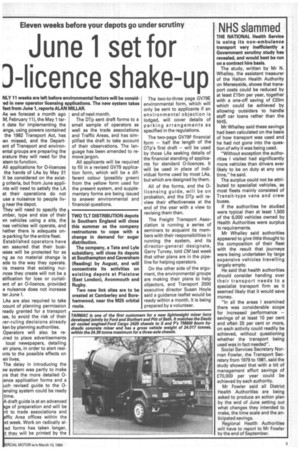NHS slammed
Page 7

If you've noticed an error in this article please click here to report it so we can fix it.
THE NATIONAL Health Service is using its non-ambulance transport very inefficiently a Government scrutiny study has revealed, and would best be run on a contract hire basis.
The study, written by Mr N. Whalley, the assistant treasurer of the Halton Health Authority on Merseyside, shows that transport costs could be reduced by at least £15m per year, together with a one-off saving of falm which could be achieved by allowing outsiders to handle staff car loans rather than the NHS.
Mr Whalley said these savings had been calculated on the basis of how transport was used and he had not gone into the question of why it was being used.
"Without exception the authorities I visited had significantly more vehicles than drivers ever likely to be on duty at any one time," he said.
The surplus could not be attributed to specialist vehicles, as most fleets mainly consisted of Transit-type vans and crew buses.
If the authorities he studied were typical then at least 1,500 of the 6,000 vehicles owned by Health Authorities were surplus to requirements.
Mr Whalley said authorities appeared to give little thought to the composition of their fleet with the result that journeys were being undertaken by large expensive vehicles travelling largely empty.
He said that health authorities should consider handing over their transport needs to a specialist transport firm as it seemed likely that it would save money.
"In all the areas I examined there was considerable scope for increased performance — savings of at least 10 per cent and often 25 per cent or more, on each activity could readily be achieved, without questioning whether the transport being used was in fact needed".
Social Services Secretary Norman Fowler, the Transport Secretary from 1979 to 1981, said the study showed that with a bit of management effort savings of 170,000 per year could be achieved by each authority.
Mr Fowler said all District Health Authoritles are being asked to produce an action plan by the end of June setting out what changes they intended to make, the time scale and the anticipated savings.
Regional Health Authorities will have to report to Mr Fowler by the end of September.




























































































